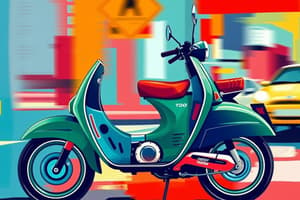Podcast
Questions and Answers
What is the maximum number of passengers allowed on a motor bicycle besides the driver?
What is the maximum number of passengers allowed on a motor bicycle besides the driver?
Who is guilty of an offence if a passenger is carried on a motor bicycle in contravention of the regulations?
Who is guilty of an offence if a passenger is carried on a motor bicycle in contravention of the regulations?
When is a person exempt from wearing protective headgear on a motorcycle?
When is a person exempt from wearing protective headgear on a motorcycle?
According to the regulations, who is responsible for the offence of not wearing a helmet if the rider is 16 years or older?
According to the regulations, who is responsible for the offence of not wearing a helmet if the rider is 16 years or older?
Signup and view all the answers
What action should be considered for minor infringements by juveniles concerning pedal cycles?
What action should be considered for minor infringements by juveniles concerning pedal cycles?
Signup and view all the answers
What is one of the key objectives of reviewing additional road offences?
What is one of the key objectives of reviewing additional road offences?
Signup and view all the answers
What is the legal requirement for persons riding on motor cycles as specified in the regulations?
What is the legal requirement for persons riding on motor cycles as specified in the regulations?
Signup and view all the answers
Which of the following statements about juvenile riders of pedal cycles is true?
Which of the following statements about juvenile riders of pedal cycles is true?
Signup and view all the answers
Who is responsible if a 17-year-old passenger is riding on a motorcycle without a helmet?
Who is responsible if a 17-year-old passenger is riding on a motorcycle without a helmet?
Signup and view all the answers
What is a driver at risk of if they have a passenger under 16 years old without a helmet?
What is a driver at risk of if they have a passenger under 16 years old without a helmet?
Signup and view all the answers
What is the main restriction regarding passengers on a bicycle?
What is the main restriction regarding passengers on a bicycle?
Signup and view all the answers
What offence is committed if two people are riding a bicycle not built for more than one passenger?
What offence is committed if two people are riding a bicycle not built for more than one passenger?
Signup and view all the answers
Which action constitutes an offence by causing danger to road users?
Which action constitutes an offence by causing danger to road users?
Signup and view all the answers
In the case of a 15-year-old passenger without a helmet, what may the older driver face?
In the case of a 15-year-old passenger without a helmet, what may the older driver face?
Signup and view all the answers
If a passenger is properly seated on a bicycle that violates the passenger restriction, what happens?
If a passenger is properly seated on a bicycle that violates the passenger restriction, what happens?
Signup and view all the answers
A person interferes with traffic equipment without lawful authority; what can they be charged with?
A person interferes with traffic equipment without lawful authority; what can they be charged with?
Signup and view all the answers
What constitutes a 'danger' according to Article 33(1) R.T.(NI) Order 1995?
What constitutes a 'danger' according to Article 33(1) R.T.(NI) Order 1995?
Signup and view all the answers
What items are considered as 'traffic equipment' under Article 33(2)?
What items are considered as 'traffic equipment' under Article 33(2)?
Signup and view all the answers
How does the removal of warning lamps affect the perception of danger?
How does the removal of warning lamps affect the perception of danger?
Signup and view all the answers
Which of the following scenarios does NOT qualify as leaving a vehicle in a dangerous position under Article 32?
Which of the following scenarios does NOT qualify as leaving a vehicle in a dangerous position under Article 32?
Signup and view all the answers
What does the term 'road' exclude according to Article 33?
What does the term 'road' exclude according to Article 33?
Signup and view all the answers
Which of the following must be proven to establish an offence related to leaving a vehicle in a dangerous position?
Which of the following must be proven to establish an offence related to leaving a vehicle in a dangerous position?
Signup and view all the answers
What is the key factor in determining whether a person should be aware of danger as described in Article 33(1)?
What is the key factor in determining whether a person should be aware of danger as described in Article 33(1)?
Signup and view all the answers
What is irrelevant when determining if an item presents obvious danger under Article 33(2)?
What is irrelevant when determining if an item presents obvious danger under Article 33(2)?
Signup and view all the answers
Under what circumstances can a constable require a vehicle to be removed?
Under what circumstances can a constable require a vehicle to be removed?
Signup and view all the answers
What constitutes a 'vehicle' as defined in the regulations?
What constitutes a 'vehicle' as defined in the regulations?
Signup and view all the answers
What is the consequence of intentionally obstructing the removal of a vehicle?
What is the consequence of intentionally obstructing the removal of a vehicle?
Signup and view all the answers
What must a constable do if they encounter a vehicle that requires removal?
What must a constable do if they encounter a vehicle that requires removal?
Signup and view all the answers
Which of the following is NOT a reason for a vehicle to be removed by a constable?
Which of the following is NOT a reason for a vehicle to be removed by a constable?
Signup and view all the answers
In which situation would a constable NOT have the power to remove a vehicle?
In which situation would a constable NOT have the power to remove a vehicle?
Signup and view all the answers
What is the age of SINGH mentioned in the scenario regarding the motorcycle?
What is the age of SINGH mentioned in the scenario regarding the motorcycle?
Signup and view all the answers
What does Article 48(2) authorize a constable to do?
What does Article 48(2) authorize a constable to do?
Signup and view all the answers
Study Notes
Motorcycle Passengers
- A motorbike can only carry one passenger in addition to the driver.
- The passenger must sit astride the bike on a proper seat behind the driver.
- Only the driver can be guilty of carrying a passenger in contravention of these rules.
Protective Headwear
- Every person driving or riding on a motorcycle or other type of vehicle must wear a helmet, except passengers in sidecars, or when the vehicle is being propelled by a person on foot, or when a follower of the Sikh religion is wearing a turban.
- If a person over 16 years of age is riding a motorcycle without a helmet, the rider is responsible for the offence.
- If the driver of a motorcycle has a passenger over the age of 16 who is not wearing a helmet, the passenger is responsible for the offence.
- If the driver of a motorcycle has a passenger under 16 who is not wearing a helmet, the driver may be responsible for aiding and abetting the passenger.
Cycle Passengers
- A bicycle may only carry one person on the road unless it is specifically built for multiple passengers.
- If the rules about passengers on a bicycle are broken, everyone on the bike is guilty of an offence, even the person on the proper seat.
Causing Danger to Road Users
- It is an offence to cause anything to be on or over a road or to interfere with a motor vehicle, trailer or cycle, or to interfere with traffic equipment, if it would be obvious to a reasonable person that doing so would be dangerous.
- For the purposes of this offence, danger refers to injury to any person on or near a road, or serious damage to property on or near a road.
- It is important to consider whether a person could be expected to be aware of the danger and any circumstances that were known to the accused.
- This offence is not limited to the usual items that would cause dangerous situations, it could include things like mud, oil, nails, a rope, or a tree.
- The nature of the item used to cause the danger is irrelevant, so long as a reasonable person would perceive an obvious danger.
- If multiple people consecutively contribute to the danger by removing traffic signs, for example, they could each be prosecuted, even if they knew about each other’s actions.
- A footpath is not considered a "road" for the purposes of this offence.
Leaving Vehicles in a Dangerous Position
- It is an offence to leave a vehicle on a road in a position, condition or circumstances that would cause the risk of injury to any person on the road.
- To be guilty of this offence an individual must be in control of the vehicle and caused or permitted it to remain at rest in a dangerous position that would be likely to cause danger.
Power of Constable to Require Removal of Vehicle
- Police constables may require the removal of a vehicle that is broken down or has been left on the road in a position, condition or circumstances that is an obstruction, or that is likely to cause danger.
- This also includes any vehicle that has been left on a road in contravention of a statutory prohibition or restriction.
- The constable may require the owner, driver or any person in charge of the vehicle to remove it as soon as possible.
- This applies to any vehicle, regardless of whether it is in a fit state for use on the road.
Power of Constable to Remove Vehicles
- Police constables may remove a vehicle that has been left on the road in contravention of the above rules to another position on that or another road, or to a place that is not a road.
Offence
- It is an offence to intentionally obstruct, impede, or assist another person to obstruct the removal of a vehicle.
Studying That Suits You
Use AI to generate personalized quizzes and flashcards to suit your learning preferences.
Related Documents
Description
Test your knowledge on important regulations regarding motorcycle and bicycle passengers. Understand who is liable for helmet use and passenger seating rules. This quiz covers the essential guidelines you need to follow for safety on two-wheeled vehicles.



